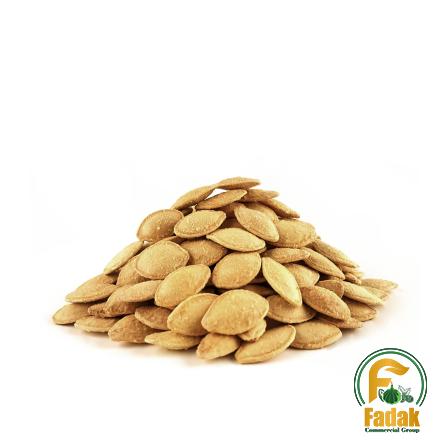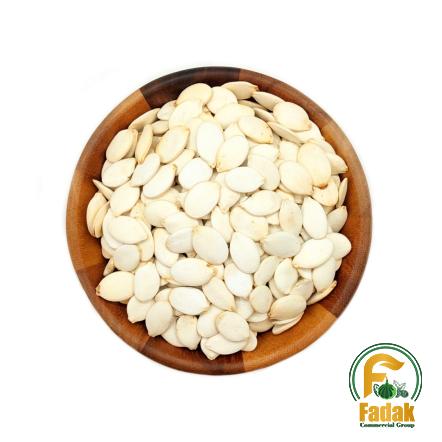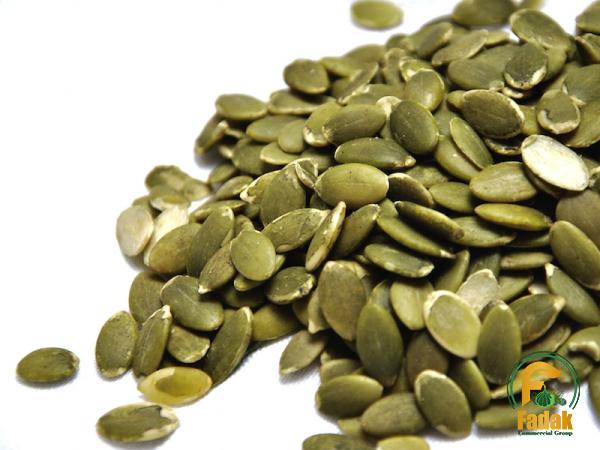Bulk almonds organic refers to the purchase or sale of a large quantity of organic almonds. Almonds are highly nutritious nuts that are known for their health benefits, including being a good source of healthy fats, proteins, vitamins, and minerals. Organic almonds are grown without the use of synthetic pesticides, herbicides, or genetically modified organisms (GMOs), making them a popular choice for health-conscious consumers. The demand for organic almonds has been steadily growing in recent years due to increased consumer awareness about the benefits of organic farming practices, as well as concerns about the potential health and environmental risks associated with conventional agriculture. Buying almonds in bulk allows consumers or businesses to save money and ensure a steady supply of these nutritious nuts. Organic almond farming involves using sustainable and natural methods to promote soil health, biodiversity, and water conservation. These practices include crop rotation, cover cropping, composting, and integrated pest management. By avoiding the use of synthetic chemicals, organic almond farmers strive to protect the environment, improve the quality of the soil, and maintain the health of the surrounding ecosystems. To meet the demand for bulk organic almonds, farmers often work with co-operatives, suppliers, or wholesalers who specialize in sourcing and distributing these products. These intermediaries connect organic almond farmers with buyers, ensuring a smooth and efficient supply chain. Working with reputable suppliers is crucial to guarantee the quality and authenticity of organic almonds, as any compromise in the organic certification process can damage the reputation of the entire industry. Bulk almonds organic can be sold to various types of buyers, including retail stores, restaurants, food manufacturers, and online sellers. For retailers and restaurant owners, purchasing organic almonds in bulk offers cost savings, as the price per unit is typically lower compared to buying smaller quantities. Food manufacturers often use bulk almonds as ingredients in various products, such as snacks, cereals, and baked goods. Moreover, the popularity of online shopping platforms has made it easier for consumers to access bulk organic almonds. Online sellers provide convenience and ease of purchasing, allowing individuals or businesses to order the desired quantity of organic almonds and have them delivered to their doorstep. When buying bulk almonds organic, buyers should consider several factors to ensure the quality and integrity of the product. Firstly, it is important to verify the organic certification of the almonds. This certification ensures that the almonds have been produced in accordance with strict organic standards. Buyers should look for third-party certifications, such as those from the United States Department of Agriculture (USDA) or other reputable organizations. Additionally, buyers should consider the sourcing practices of the suppliers or wholesalers.

nut
 It is recommended to choose suppliers who have direct relationships with organic almond farmers, as this indicates a higher level of traceability and transparency in the supply chain. Suppliers should be able to provide information about the farming practices, origin, and handling of the almonds. Furthermore, buyers should assess the quality and freshness of the almonds. Organic almonds are typically harvested when they are fully matured and at peak flavor. They should have a crunchy texture and a mildly sweet, nutty taste. It is important to check for any signs of rancidity, mold, or insect damage, as these can indicate poor quality or improper storage of the almonds. Proper storage is essential to maintain the freshness and extend the shelf life of bulk almonds organic. Almonds should be stored in a cool, dry place away from direct sunlight, moisture, and strong odors. It is recommended to transfer the almonds to airtight containers or resealable bags to protect them from potential contaminants and prevent oxidation. In conclusion, bulk almonds organic offer an affordable and convenient way to access a large quantity of high-quality organic almonds. The demand for organic almonds has been driven by increasing consumer awareness and preference for organic produce. Organic almond farming practices focus on sustainability and environmental stewardship, promoting healthy soil, biodiversity, and water conservation. When purchasing bulk almonds organic, buyers should ensure the organic certification, consider the sourcing practices, and check the quality and freshness of the product. 1. Benefits of Bulk Almonds Organic: Buying organic almonds in bulk offers several benefits for businesses. Firstly, it allows companies to save money in the long run. When purchasing in bulk, the price per unit is typically lower compared to buying smaller quantities. This can result in significant cost savings, especially for businesses that use almonds as a primary ingredient in their products or sell them as standalone items. In addition to cost savings, bulk purchasing ensures a steady supply of organic almonds. By having a larger quantity on hand, businesses can avoid stockouts and meet the demands of their customers effectively. This is particularly important for food manufacturers or restaurants that rely on almonds as a crucial ingredient in their recipes. Furthermore, bulk almonds organic provide businesses with the opportunity to maintain their branding and marketing claims. For companies that position themselves as organic or environmentally sustainable, using organic ingredients such as almonds is essential to support their messaging. By purchasing bulk almonds organic, businesses can ensure the integrity and authenticity of their product offerings.
It is recommended to choose suppliers who have direct relationships with organic almond farmers, as this indicates a higher level of traceability and transparency in the supply chain. Suppliers should be able to provide information about the farming practices, origin, and handling of the almonds. Furthermore, buyers should assess the quality and freshness of the almonds. Organic almonds are typically harvested when they are fully matured and at peak flavor. They should have a crunchy texture and a mildly sweet, nutty taste. It is important to check for any signs of rancidity, mold, or insect damage, as these can indicate poor quality or improper storage of the almonds. Proper storage is essential to maintain the freshness and extend the shelf life of bulk almonds organic. Almonds should be stored in a cool, dry place away from direct sunlight, moisture, and strong odors. It is recommended to transfer the almonds to airtight containers or resealable bags to protect them from potential contaminants and prevent oxidation. In conclusion, bulk almonds organic offer an affordable and convenient way to access a large quantity of high-quality organic almonds. The demand for organic almonds has been driven by increasing consumer awareness and preference for organic produce. Organic almond farming practices focus on sustainability and environmental stewardship, promoting healthy soil, biodiversity, and water conservation. When purchasing bulk almonds organic, buyers should ensure the organic certification, consider the sourcing practices, and check the quality and freshness of the product. 1. Benefits of Bulk Almonds Organic: Buying organic almonds in bulk offers several benefits for businesses. Firstly, it allows companies to save money in the long run. When purchasing in bulk, the price per unit is typically lower compared to buying smaller quantities. This can result in significant cost savings, especially for businesses that use almonds as a primary ingredient in their products or sell them as standalone items. In addition to cost savings, bulk purchasing ensures a steady supply of organic almonds. By having a larger quantity on hand, businesses can avoid stockouts and meet the demands of their customers effectively. This is particularly important for food manufacturers or restaurants that rely on almonds as a crucial ingredient in their recipes. Furthermore, bulk almonds organic provide businesses with the opportunity to maintain their branding and marketing claims. For companies that position themselves as organic or environmentally sustainable, using organic ingredients such as almonds is essential to support their messaging. By purchasing bulk almonds organic, businesses can ensure the integrity and authenticity of their product offerings.
Specifications of nut
 2. Choosing a Reliable Supplier for Bulk Almonds Organic: When buying bulk almonds organic, it is crucial to choose a reliable supplier to guarantee the quality and authenticity of the product. Here are some key factors to consider when selecting a supplier: a. Organic Certification: Ensure that the supplier has the necessary organic certifications, such as those provided by the USDA or other reputable organizations. This certification ensures that the almonds have been produced according to strict organic standards. b. Traceability: Look for suppliers who have direct relationships with organic almond farmers. This ensures a higher level of traceability and transparency in the supply chain, reducing the risk of contamination or mislabeling. c. Quality Control: Inquire about the supplier’s quality control processes. They should have procedures in place to check for the quality and freshness of the almonds, including inspecting for signs of rancidity, mold, or insect damage. d. Packaging and Storage: Consider the packaging and storage practices of the supplier. Almonds should be stored and transported in appropriate conditions to maintain their freshness and extend their shelf life. Look for suppliers who utilize airtight containers or resealable bags to protect the almonds from potential contaminants and oxidation. 3. Applications of Bulk Almonds Organic: Bulk almonds organic can be used in a variety of applications across different industries. Here are some examples of how businesses can incorporate organic almonds into their products: a. Food Manufacturing: Almonds are a popular ingredient in various food products, including snacks, confectioneries, cereals, and baked goods. Food manufacturers can use bulk almonds organic to create almond butter, almond milk, almond flour, or include them as toppings in their products. b. Restaurants and Catering: Almonds can add flavor and texture to savory dishes, salads, and desserts. Restaurants and catering businesses can use bulk almonds organic to create signature dishes, garnish salads, or incorporate them into desserts like almond tart or almond-crusted fish. c. Retail Stores and Specialty Shops: Offering bulk almonds organic in retail stores or specialty shops provides health-conscious consumers with the opportunity to purchase high-quality organic almonds in the quantities they desire. Retailers can promote the health benefits of almonds and their organic certification to attract customers. 4. Marketing and Packaging: Effective marketing and packaging play a vital role in promoting bulk almonds organic to potential buyers. Here are some strategies businesses can consider: a. Highlight Health Benefits: Almonds are known for their health benefits, such as being a good source of healthy fats, proteins, vitamins, and minerals.
2. Choosing a Reliable Supplier for Bulk Almonds Organic: When buying bulk almonds organic, it is crucial to choose a reliable supplier to guarantee the quality and authenticity of the product. Here are some key factors to consider when selecting a supplier: a. Organic Certification: Ensure that the supplier has the necessary organic certifications, such as those provided by the USDA or other reputable organizations. This certification ensures that the almonds have been produced according to strict organic standards. b. Traceability: Look for suppliers who have direct relationships with organic almond farmers. This ensures a higher level of traceability and transparency in the supply chain, reducing the risk of contamination or mislabeling. c. Quality Control: Inquire about the supplier’s quality control processes. They should have procedures in place to check for the quality and freshness of the almonds, including inspecting for signs of rancidity, mold, or insect damage. d. Packaging and Storage: Consider the packaging and storage practices of the supplier. Almonds should be stored and transported in appropriate conditions to maintain their freshness and extend their shelf life. Look for suppliers who utilize airtight containers or resealable bags to protect the almonds from potential contaminants and oxidation. 3. Applications of Bulk Almonds Organic: Bulk almonds organic can be used in a variety of applications across different industries. Here are some examples of how businesses can incorporate organic almonds into their products: a. Food Manufacturing: Almonds are a popular ingredient in various food products, including snacks, confectioneries, cereals, and baked goods. Food manufacturers can use bulk almonds organic to create almond butter, almond milk, almond flour, or include them as toppings in their products. b. Restaurants and Catering: Almonds can add flavor and texture to savory dishes, salads, and desserts. Restaurants and catering businesses can use bulk almonds organic to create signature dishes, garnish salads, or incorporate them into desserts like almond tart or almond-crusted fish. c. Retail Stores and Specialty Shops: Offering bulk almonds organic in retail stores or specialty shops provides health-conscious consumers with the opportunity to purchase high-quality organic almonds in the quantities they desire. Retailers can promote the health benefits of almonds and their organic certification to attract customers. 4. Marketing and Packaging: Effective marketing and packaging play a vital role in promoting bulk almonds organic to potential buyers. Here are some strategies businesses can consider: a. Highlight Health Benefits: Almonds are known for their health benefits, such as being a good source of healthy fats, proteins, vitamins, and minerals.
buy nut
 Emphasize these benefits on product labels and marketing materials to appeal to health-conscious consumers. b. Organic Certification: Clearly display the organic certification symbol on packaging to communicate to customers that the almonds are produced without the use of synthetic pesticides, herbicides, or GMOs. This helps build trust and assures consumers that they are purchasing an authentic organic product. c. Transparent Sourcing: Share information about the sourcing practices, farming methods, and environmental stewardship initiatives of the almond farmers. This helps customers understand the commitment to sustainable and organic farming practices. d. Sustainability Focus: Highlight the environmental benefits of organic almond farming, such as soil health improvement, biodiversity conservation, and reduced water usage. This messaging can resonate with consumers who prioritize eco-friendly products and support sustainable farming practices. 5. Building Long-Term Business Relationships: Establishing and maintaining long-term business relationships with suppliers is essential for ensuring a steady supply of bulk almonds organic. Here are some strategies to build strong and lasting partnerships: a. Communication: Maintain open and clear lines of communication with suppliers. Regularly check in to discuss quantities, delivery schedules, and any concerns or changes that may impact the supply chain. b. Collaboration: Collaborate with suppliers to optimize processes, reduce waste, and improve efficiency. This can include sharing forecasts, working together to streamline logistics, and jointly exploring new opportunities or product offerings. c. Quality Assurance: Conduct regular quality checks on the almonds received from the supplier. Provide feedback on any issues or concerns promptly to maintain the quality and integrity of the product. d. Loyalty Programs: Consider implementing loyalty programs that reward frequent or long-term customers. This can help foster a sense of partnership and incentivize businesses to continue purchasing bulk almonds organic from a specific supplier. 6. Overcoming Challenges: The bulk almonds organic industry faces several challenges that businesses need to navigate. These challenges include: a. Price Fluctuations: The price of organic almonds can be subject to fluctuations due to factors such as market demand, weather conditions, or supply chain disruptions. Businesses should conduct market research and establish contingencies to manage potential price fluctuations. b. Supply Chain Logistics: Coordinating the transportation and storage of bulk quantities of almonds can be complex. Businesses should work closely with suppliers to ensure efficient logistics and mitigate any potential disruptions or delays. c. Quality Control: Maintaining the quality and freshness of bulk almonds organic can be challenging, especially during storage and transportation. It is crucial to work with suppliers who prioritize quality control, proper packaging, and appropriate storage practices. d. Changing Consumer Preferences: Stay abreast of evolving consumer trends and preferences. As consumer demand shifts towards specific almond varieties (such as organic, non-GMO, or sustainably sourced), businesses must adapt their product offerings accordingly to stay competitive. In conclusion, bulk almonds organic offer numerous benefits for businesses, including cost savings, a steady supply, and support for branding and marketing claims. Choosing a reliable supplier is crucial to ensure the quality and authenticity of the product. Businesses can incorporate bulk almonds organic into their products, market them effectively, and build long-term relationships with suppliers to secure a consistent supply. Despite industry challenges, with proper strategies and adaptability, businesses can thrive in the bulk almonds organic market.
Emphasize these benefits on product labels and marketing materials to appeal to health-conscious consumers. b. Organic Certification: Clearly display the organic certification symbol on packaging to communicate to customers that the almonds are produced without the use of synthetic pesticides, herbicides, or GMOs. This helps build trust and assures consumers that they are purchasing an authentic organic product. c. Transparent Sourcing: Share information about the sourcing practices, farming methods, and environmental stewardship initiatives of the almond farmers. This helps customers understand the commitment to sustainable and organic farming practices. d. Sustainability Focus: Highlight the environmental benefits of organic almond farming, such as soil health improvement, biodiversity conservation, and reduced water usage. This messaging can resonate with consumers who prioritize eco-friendly products and support sustainable farming practices. 5. Building Long-Term Business Relationships: Establishing and maintaining long-term business relationships with suppliers is essential for ensuring a steady supply of bulk almonds organic. Here are some strategies to build strong and lasting partnerships: a. Communication: Maintain open and clear lines of communication with suppliers. Regularly check in to discuss quantities, delivery schedules, and any concerns or changes that may impact the supply chain. b. Collaboration: Collaborate with suppliers to optimize processes, reduce waste, and improve efficiency. This can include sharing forecasts, working together to streamline logistics, and jointly exploring new opportunities or product offerings. c. Quality Assurance: Conduct regular quality checks on the almonds received from the supplier. Provide feedback on any issues or concerns promptly to maintain the quality and integrity of the product. d. Loyalty Programs: Consider implementing loyalty programs that reward frequent or long-term customers. This can help foster a sense of partnership and incentivize businesses to continue purchasing bulk almonds organic from a specific supplier. 6. Overcoming Challenges: The bulk almonds organic industry faces several challenges that businesses need to navigate. These challenges include: a. Price Fluctuations: The price of organic almonds can be subject to fluctuations due to factors such as market demand, weather conditions, or supply chain disruptions. Businesses should conduct market research and establish contingencies to manage potential price fluctuations. b. Supply Chain Logistics: Coordinating the transportation and storage of bulk quantities of almonds can be complex. Businesses should work closely with suppliers to ensure efficient logistics and mitigate any potential disruptions or delays. c. Quality Control: Maintaining the quality and freshness of bulk almonds organic can be challenging, especially during storage and transportation. It is crucial to work with suppliers who prioritize quality control, proper packaging, and appropriate storage practices. d. Changing Consumer Preferences: Stay abreast of evolving consumer trends and preferences. As consumer demand shifts towards specific almond varieties (such as organic, non-GMO, or sustainably sourced), businesses must adapt their product offerings accordingly to stay competitive. In conclusion, bulk almonds organic offer numerous benefits for businesses, including cost savings, a steady supply, and support for branding and marketing claims. Choosing a reliable supplier is crucial to ensure the quality and authenticity of the product. Businesses can incorporate bulk almonds organic into their products, market them effectively, and build long-term relationships with suppliers to secure a consistent supply. Despite industry challenges, with proper strategies and adaptability, businesses can thrive in the bulk almonds organic market.










Your comment submitted.